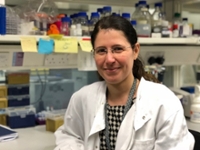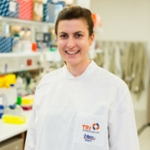Q: How did you find out about the Komen Tissue Bank, and why did it interest you?
When I decided to work on the association between pregnancy and breast cancer risk, I knew the major obstacle would be the collection of samples. Even if the UK, and Europe in general, have many excellent tissue banks, finding normal breast not affected by any disease is really hard. I therefore started to look online for more and more tissue banks, and that is how I found out about KTB. I was really impressed by the samples it provided, by all the necessary clinical information which came with those, and it really sparked my interest in all the potential findings these samples could lead to.
Q: What types of samples have you obtained from the Komen Tissue Bank?
We have received 60 tissue samples of frozen normal breast from pregnant and non-pregnant women at different age groups.
Q: What do you hope to discover/have you discovered in your research?
Several studies have observed a correlation between the age of a first-time full pregnancy and the risk of developing breast cancer. Women who have their first child at a younger age (below 24 years of age) have a lower risk of developing post-menopausal breast cancer compared to women who do not have a child. These women have even a lower risk compared to an older first-time mother (above 35 years of age). The molecular reason for this association, however, is still unknown.
The aim of our project is to look at how the mutation burden of the normal breast changes during age and during pregnancy, and to determine if there are any mutations in the cancer genes already present in the normal breast. This means we want to see how many mutations the normal cells accumulate during the years, and which effect this ultimately has in the development of breast cancer.
We have now completed the analysis of a first set of samples, and we can indeed detect several mutations in areas regulating cancer genes. We are really looking forward completing the analysis from all the samples and to determine how the changes in the mutation rates in the normal breast affect the cancerous breast.
Q: How will the Komen Tissue Bank samples help with your research? What value do they add?
The samples from KTB are at the core of our research, as we do all our analysis on those normal samples. The possibility of knowing exactly the age of pregnancy, the medication history, and the quality of the samples before actually receiving them, makes this set of normal breast unique. It would be very difficult for us to collect the same number of homogenous samples from a different source.
Q: Please explain in lay terms how your research might impact treatment options for BC patients in the future?
Delayed motherhood is often a feature in the wealthiest countries, as women have higher access to methods to control pregnancy, assisted reproduction and/or ultimately prefer to follow different life choices. While the choice of parenthood is personal, it is important for a woman to know that the probability of developing breast cancer after menopause can change with the age of first-time pregnancy. Once we know what factors are at the base of this association, we would be able to include women at risk, for example older mothers with a genetic predisposition, to a program of higher surveillance and screening after their pregnancy. Furthermore, knowing how changes in the DNA (mutations) occur in the normal healthy breast will form the basis of future scientific work on other diseases of the breast, even if they are not related to cancer.
Q: Our readers would love to know some personal information about you. Tell us anything at all that you feel comfortable talking about.
As a child, I never had straightforward career paths in mind. I defined myself as a potential archeologist, vet, astronaut and fashion designer… not in a specific order! You can see most of these professions have some sort of exploration in them, and that’s how I turned out to be a researcher, I guess. I’m so fascinated by what happens inside every single tiny cells of our body, which is like a little organized city on its own.
I now live in London, UK, but I come from Italy, and I also spent one year in Sweden. I therefore really enjoy what multiculturality brings to my daily life: different food to try, music to listen to, languages to learn, places to visit. I think I owe this to my parents. When I was little they bought a campervan and we visited lots of Europeans countries.
My favorite thing was, and I must say still is, going into local supermarkets and trying the typical food of the different places… my friends still laugh at me when I do this! Nowadays, however, I prefer a nice hotel to a campervan.
When I am not thinking science, I love baking. I am not really good at decorating cakes, but I still try and often laugh at my miserable efforts… but they still taste good. Very occasionally, they also look pretty, which is very satisfactory!







